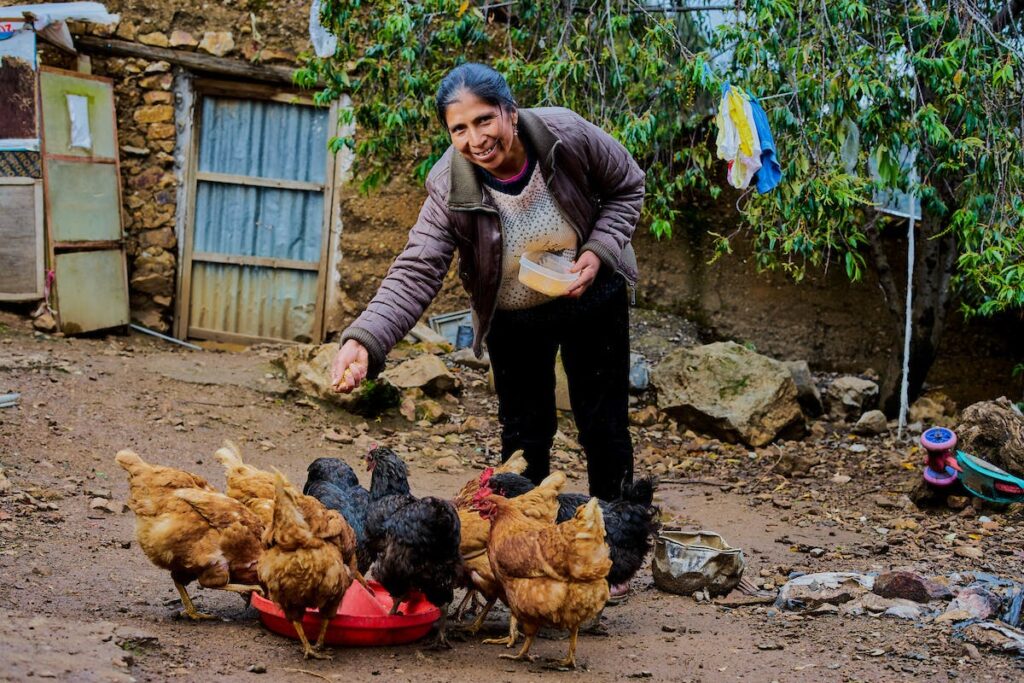Nilda Apari is a mother of four children who lives with her husband in the community of Quinta Boliviana–Huancavelica in Peru. As part of caring for her children, she raised hens in an attempt to provide food for them to eat.
But the hens contributed only a portion of the food needed for the family, since they only produced one or two eggs a day. ”At one point, I had a dozen hens but still didn’t have nearly enough eggs to feed my family,” Nilda said.
What the worried mother wanted most was to “prevent my children from falling into anemia.”
A Mom Without Hope
With little access to nutritional food and protein, her younger children in particular were susceptible to anemia and other diseases. In addition to poor production from her chickens, it wasn’t always easy for her to purchase food from the nearby markets. Not only was the food too expensive, but she avoided traveling to the markets frequently.
Those living in Nilda’s area must walk downhill to the markets – and then anything purchased must be carried home, up 100 meters of very steep steps.
“I felt overwhelmed, and without hope,” she said.
FH Sponsorship Brings Answers
Nilda became aware of Food for the Hungry (FH) through activities they organized for children in her area. She was very happy when her son Jhonier, 13, and daughter, Camila, 4, were enrolled in FH child sponsorship. It meant help with school, nutrition, and other needs. And soon, Nilda received information about FH workshops for adults.

Not long after that, an FH facilitator came to Nilda’s home and told her and her husband. Wilfredo, about an FH program called “Goodness of My Land.” It focuses on agricultural projects, including raising guinea pigs and improving laying hens production. Nilda immediately signed up to participate and has been active ever since.
Gustavo Rojas, FH Peru facilitator, says a major focus for FH in Peru is on the dangers of anemia, which have worsened in the area since the pandemic. “Peru’s national average for this condition is very high, at 38.8%,” he said. But Huancavelica – the area where Nilda and her family live – records a rate of nearly 60 percent, Rojas said.
Learning How To Succeed
In addition to learning ways to improve her children’s nutrition, Nilda learned ways to enhance her family’s livelihood at the FH sessions. FH teaches these skills because improving vocations is a key part of FH’s initiatives to strengthen communities and help them become more resilient to poverty.
Nilda heard about new ways to optimize raising small livestock. She added guinea pigs to her livestock production, and she learned methods to ensure her hens would lay more eggs. “The better hens eat, the more they produce,” Nilda said. Ultimately, this led to dramatic improvements in her children’s diet.

She also learned how to optimize her hens’ habitat and ensure they had the proper amount of space to encourage egg production. “My hens hadn’t been laying many eggs, and the hens of my neighbors used to die, either because of the weather or because they were poorly cared for. Now I know how to prevent all of this,” said Nilda.
“Thanks to what I learned at these training sessions, my hens produce more eggs regularly. I now have nine hens and every day I get 8 eggs, sometimes as many as 10,” Nilda explained happily.
Chickens and Goals Grow
Now that her children are eating well, her new goal is to be able to grow her hatchery and sell excess eggs produced by her hens at the markets.

“In the future, I would like to have a chicken farm and then add other animals. I will teach the members of my family to help with the farm, and I will sell more and more, so that my children can have a good life,” she added.
You May Also Enjoy These Posts:
For a Cambodian Father, Faith Changes Values



